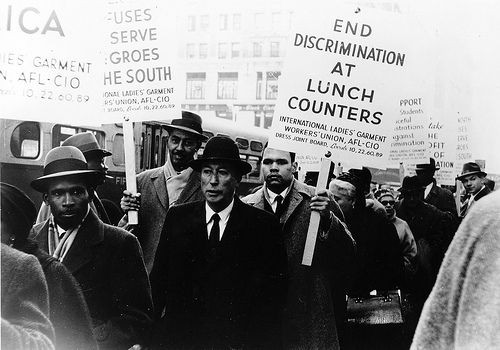Can Racism Make You Age Faster? Discrimination Found To Accelerate Telomere Shortening In Black Men

Black men who have faced discrimination because of their race and have since adopted certain anti-black ideas themselves may face an accelerated form of aging, according a new study.
Cellular aging is thought to be the result of numerous factors, but one biomarker — known as telomere shortening — has been revered as the most accurate. Researchers from the University of Maryland, College Park, used the indicator as a basis for their analysis of the effects of lifelong racism and discrimination. They found the men who had been profiled and harassed, in both the workplace and in public, showed more advanced signs of telomere shortening than men who had faced less racism, and, interestingly, than men who didn’t hold racist beliefs themselves.
Think of telomeres as the plastic tips on the ends of shoelaces (“aglets,” to be precise), but for chromosomes. They protect the DNA within the chromosome, acting as a barrier to prevent the chromosome from fraying or the DNA from breaking. Since cell division is crucial for growing new skin, blood, bone, and other cells, telomeres must prevent the main part of the chromosome from getting shorter each time division takes place. The problem is, DNA must replicate each time the cell divides (it needs an exact copy of itself, after all), but chromosomes only have limited supplies of an enzyme called telomerase. This enzyme adds base pairs to the ends of telomeres, which allows them to keep their length, and, thus, slow aging.
"Telomere length may be a better indicator of biological age, which can give us insight into variations in the cumulative 'wear and tear' of the organism net of chronological age," study leader and assistant professor in the university’s School of Public Health, Dr. David H. Chae, said in a statement.
The average human begins life with around 8,000 base pairs. Over time that number shrinks at an accelerating rate, dwindling to 3,000 by adulthood and reaching as low as 1,500 once a person hits old age. Chae and his colleagues observed the men who experienced racism over their lives had, on average, 140 fewer base pairs than the other men. This equated to roughly 1.4 to 2.8 fewer years of chronological age.
What’s interesting, Chae points out, is that the findings didn’t show nearly the same correlation when the subjects held strong pro-black attitudes. Of the 92 total subjects, those who maintained a sense of racial pride, despite their encountered racism, showed no telomere shortening relative to other people in their age group. The team came to these conclusions via well-documented measures of latent biases, called Implicit Association Tests. These tests require people to make snap judgments — in this case, when pairing either a white or black face with “good” or “bad” words. Combined with self-reports, these assessments gave researchers an accurate picture of the attitudes held by each subject.
This was a key difference between the two groups, Chae suggests. It revealed to researchers that while facing racism may cause a person to carry stress — a known source of cellular aging — the greatest sources were coming from the subjects themselves.
"African-American men who have more positive views of their racial group may be buffered from the negative impact of racial discrimination," explained Chae. "In contrast, those who have internalized an anti-black bias may be less able to cope with racist experiences, which may result in greater stress and shorter telomeres."
Chae has a wealth of research behind these claims. Telomere shortening has been linked to depression and other forms of mental illness, and an increase of healthy lifestyle choices, such as diet and exercise, may have greater importance for depressed individuals than for the non-depressed. As government policies such as “Stop-and-Frisk” continue to exploit the biases of racist police officers, Chae argues, the potential for stressed, depressed, and rapidly aging black men increases considerably.
"Stop-and-frisk policies, and other forms of criminal profiling such as 'driving or shopping while black' are inherently stressful and have a real impact on the health of African-Americans," he said. Though conceding that the small study demands greater attention, Chae emphasized the importance of treating racism as genuinely harmful to people’s health, and not only mentally, he said. "Our findings suggest that racism literally makes people old."
Source: Chae D, Nuru-Jeter A, Adler N. Discrimination, Racial Bias, and Telomere Length in African-American Men. American Journal of Preventive Medicine. 2014.



























